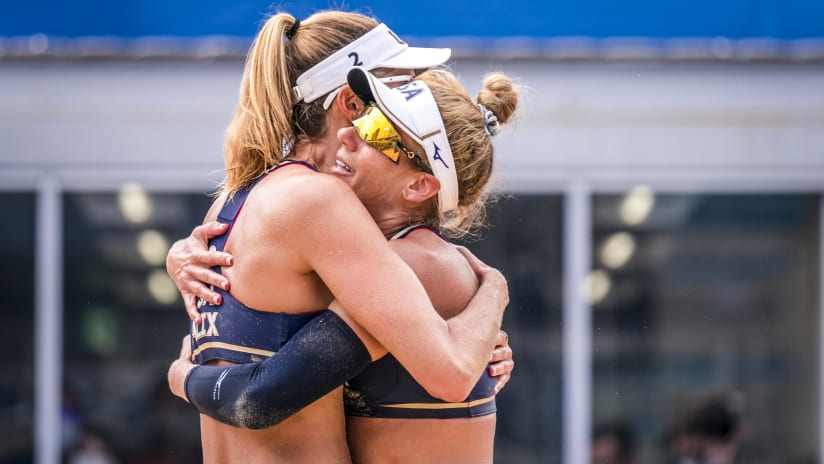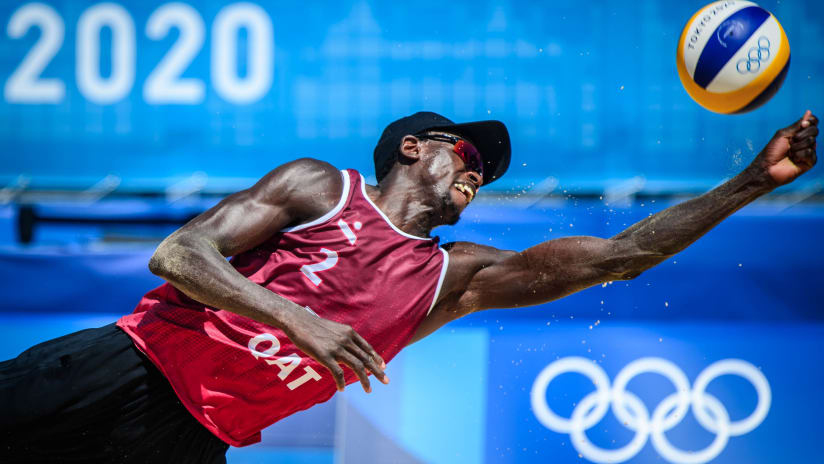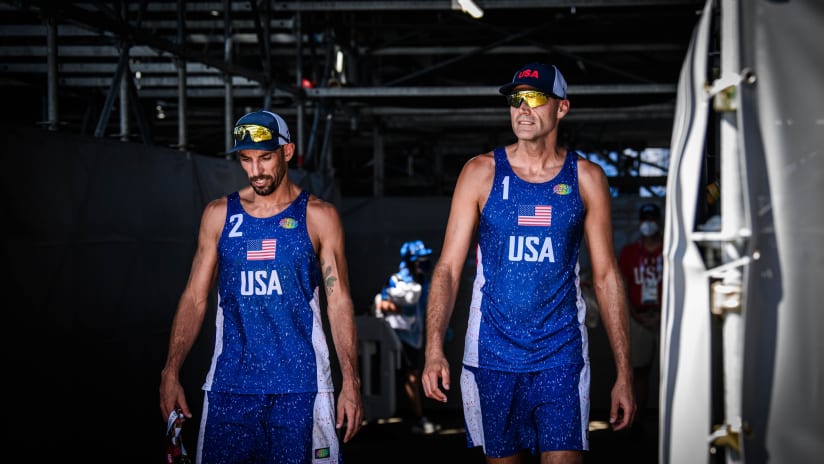Looking back, everything, of course, is seen with clarity – predicting the gold medallists of the 2016 Rio Olympics shouldn’t have been all that difficult. Germany’s Laura Ludwig and Kira Walkenhorst were the hottest team in the world, having gold at both the Hamburg Major and in Poland, bronze in Gstaad, and gold once more at the Klagenfurt Major, the final event prior to the Olympic Games.
Olympic Games Tokyo 2020 - Beach Volleyball
Most underdogs in history make women's beach volleyball quarterfinals
With teams seeded 10, 12, 16, and 18 in the quarters, who will be Tokyo's Cinderella?
Published 10:33, 02 Aug 2021
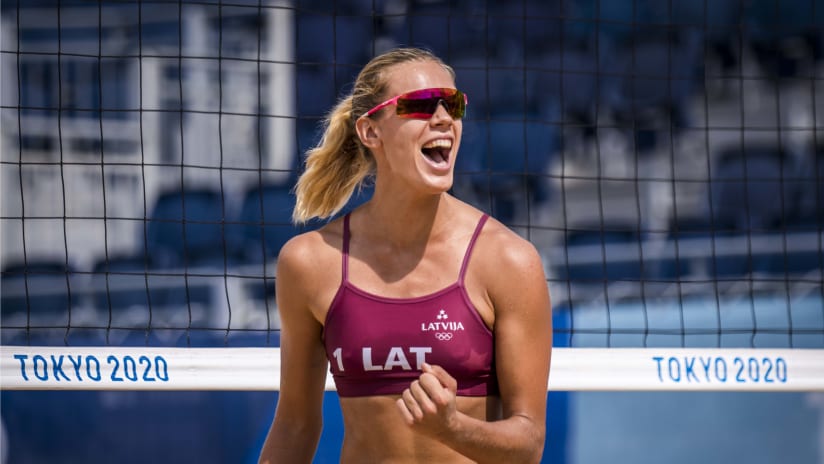
Tina Graudina of Latvia celebrates a point
In a way, the dominant show Ludwig and Walkenhorst put on in Rio shouldn’t have been all that surprising. They lost only a single set en route to gold, sweeping the 10, 5, 1 and 2 seeds in the playoffs to claim the top spot on the podium. It was right in tune with how they had been playing in the six weeks leading up to the Games.
Yet if that same logic were applied to these 2021 Olympic Games, using the most recent events to predict what would be to come, viewers would be – and have been – in for quite the surprise. In the first round of elimination alone, gone are the two teams who have combined to win the last three gold medals on the FIVB Beach Volleyball World Tour. Brazilians Agatha Bednarczuk and Eduarda 'Duda' Lisboa, the three seed in these Olympic Games, medalled 10 times throughout the Olympic qualifying process, including gold in Gstaad, the final event leading up to Tokyo. They’re out, victims of a first-round upset at the hands of the ageless Ludwig and Margareta Kozuch, 19-21, 21-19, 14-16.
Kelly Claes and Sarah Sponcil did not win in Gstaad, but they did win gold in the two events prior to it, in Sochi and Ostrava. They, too, are out early, victims of another first-round upset, this one at the hands of Canadians Brandie Wilkerson and Heather Bansley. On paper, as far as seeding goes, it wasn’t a massive upset; Canada is seeded tenth, the Americans ninth. But momentum had been favouring Claes and Sponcil, who appeared to be peaking at the perfect time in the leadup to these Games.
The leadup in Tokyo thus far has, simply, not been the harbinger of what is to come that the leadup to Rio was.
Joining the Canadians and Germans in the engineering of upsets is Latvia’s Tina Graudina and Anastasija Kravcenoka. The 16th-seeded Latvians felled the eight seed from Russia, Svetlana Kholomina and Nadezda Makroguzova, 16-21, 21-17, 15-13 to move on to the quarterfinals.
Technically speaking, there was an upset that was also, depending on how you view it, not really an upset. China’s Fan Wang and Xinyi Xia surprisingly swept their pool, stunning Agatha and Duda, upsetting Bansley and Wilkerson, and sweeping Argentina. Meanwhile, fourth-seeded Rebecca Cavalcanti and Ana Patricia Silva of Brazil emerged just 1-2 and third in pool play. China, then, met Brazil, as technically the higher-seeded team in playoffs before bowing out to them in straight sets, 14-21, 21-23.
The final upset of the first round is also something of a technicality. Swiss Anouk Verge-Depre and Joana Heidrich entered these Games as the 12 seed, though they also entered as the European Champs and silver medallists in Ostrava, the penultimate event of the FIVB season prior to Tokyo. As fate would cruelly have it, they’d meet fellow countrywomen and seventh-seeded Nina Betschart and Tanja Huberli in the first round of elimination, coming away with a 21-12, 19-21, 23-21 victory to push them into the quarterfinals.
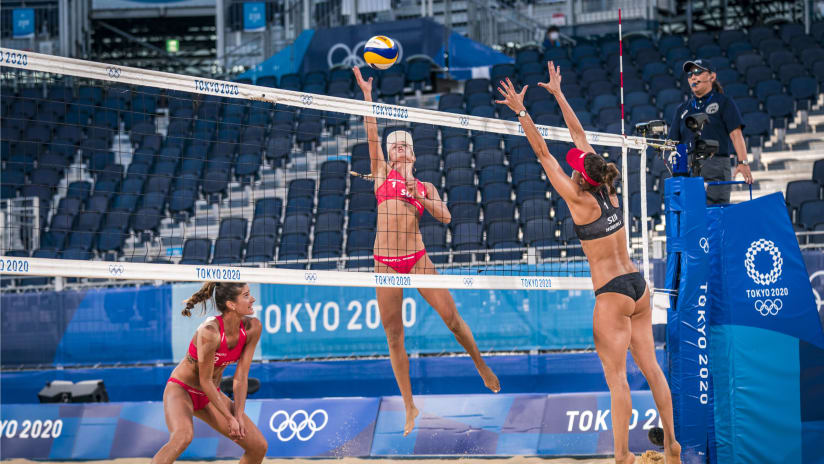
Anouk Vergé-Dépré in action in the match between two Swiss teams in the round of 16
Of the eight teams remaining, exactly half are seeded outside of the top 8, with Ludwig and Kozuch the highest of the bunch, at 18. The average seed of the eight teams in the quarterfinals is 8.5, the highest in women's Olympic beach volleyball history.
And yet, in spite of that historically high number, there is no medal favourite, nor is there a massive underdog.
It’s just eight phenomenal beach volleyball teams, seeded one through 18, each with a shot at gold, and no telling who will win it.

